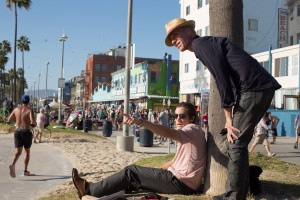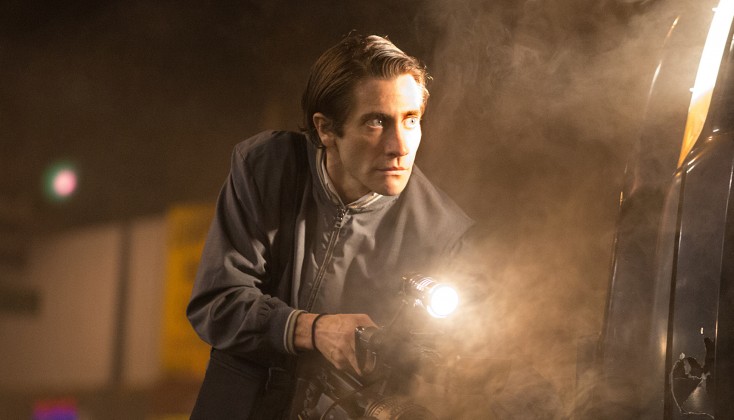
Jake Gyllenhaal and Director/Writer Dan Gilroy on the set of NIGHTCRAWLER. ©Open Road Films. CR: Chuck Zlotnick.
By ANGELA DAWSON
Front Row Features
HOLLYWOOD—A native Angeleno, Jake Gyllenhaal is familiar with the unique topography of the City of Angels and its mysterious quality at night.
When screenwriter Dan Gilroy (“The Fall,” “Real Steel”) approached him about playing the lead in his first directed film, the Los Angeles-set psychological thriller “Nightcrawler,” exploring the dark subculture of freelance TV crime journalism, the Academy Award nominated actor (“Brokeback Mountain”) was eager to get on board as a producer as well as star in it.
Shedding roughly 30 pounds for the role of oddball freelance TV cameraman Louis Bloom, Gyllenhaal’s normally handsome face appears drawn and weary, his blue eyes like giant bloodshot saucers in the film. Enabled by a ruthless TV news producer Nina Romina (played by Gilroy’s wife actress Rene Russo), who will stop at nothing to boost her station’s sagging ratings, Bloom blossoms in the job of shooting increasingly graphic crime scene footage as a stringer. With money to be made and the still beautiful Nina eating out of his hands, how far will Louis go to get the video? “Nightcrawler” is both an indictment on society’s insatiable appetite for gore and the rise of the rootless freelance economy, especially among young people entering the workforce.
Having put some meat back on his bones since filming “Nightcrawler,” Gyllenhaal, 33, recently spoke about what attracted him to the project, getting into character and his upcoming Broadway debut.
Q: Did you watch footage of motivational speakers because you use a lot of hand gestures when you’re using the corporate-speak Lou Bloom spouts?
Gyllenhaal: All that weird gesticulation was a bit like (writer-director) Dan Gilroy. (He chuckles.) When he talks, he stands really straight and he uses his hands a lot. So I didn’t study anybody who does self help. The words kind of guided me there. There are these strange punctuations (in the script), and I kind of followed them to a “T.” I did not veer off one word, one period or a comma throughout the whole script. It needed to be very specific. So if there was a period, I would make sure to say a period. Sometimes my hands did it for me.
Q: Is Lou a sociopath?
Gyllenhaal: My belief is in using that word it takes the onus off of us in the creation of Lou. He’s our creation. Without our need for information of all sorts, in a world where unimportant information is now important, and important information is now unimportant, and it all exists on the same plane. We just need to feed and consume in that way. He’s a product of a generation where jobs are as scarce as they have been in a long time, and they are transforming the idea of what someone does for a living. There is a whole generation coming into the world going, “What is a job? What do I do? How do I get a job?” And Lou is a product of that. He’s kind of a walking metaphor. That’s how I look at it. So I wouldn’t say he’s a sociopath. He does what he does and he is enabled by Nina, Rene’s character. He’s enabled by the guys at the station, and they are enabled by (TV viewers/consumers).
Q: Do you see a similarity Lou and the paparazzi?
Gyllenhaal: The difference between that and what Lou does is he’s dealing with life and death. Though I think there is a similar sense of no one taking responsibility (for their actions). We’re all just in it. We’re all just needing information and getting it. Whatever shocks us is what we’re bound to go towards, even if we don’t want to. We’re terrified by it and yet still interested. It’s the same idea as slowing down and looking at an accident. When you’re following somebody who’s going about living his life, it’s not comparable.
Q: How do you explain your almost unrecognizable appearance in this?
Gyllenhaal: I have the extraordinary make-up artist who worked with me on “Prisoners.” We did subtle things. One of the biggest things is that Lou only sweats once in the movie, and that was a very particular thing that we talked about beforehand. When he’s giving his speeches or when he’s talking to Riz (Ahmed, who plays his helper Rick) or when he’s being questioned by police officers in the interrogation room, he does not sweat. The only time he sweats is when he sweats out of excitement, when he’s going through (the murder crime scene at) the house. When he comes out of that, he runs down that hill and he’s driving away, and that is the only time you see him sweaty. He’s psyched. Every other exchange, there’s this cool confidence in him.
Q: How did you lose so much weight for this role?
Gyllenhaal: As we were getting into shooting, I would do stuff like run to set, and at a certain point, I was just running through Griffith Park all the time, eight to 15 miles a day. I was just training myself as a coyote, with all the coyotes and stuff, and then my face just changed. I don’t think I was really even aware of it until a few months ago when we were going through all the (editing). You start to separate from the character and go, “Wow!”
Q: Obviously, this is a work of fiction, but is there reality to it, and do you define it as okay? Is there possibly some conversation that should go on about it?
Gyllenhaal: My form of communication is through the movies that I make. That’s one thing that I can say. I consider that to be, as much as I consider that to be entertainment, and it should be entertaining, that’s why this movie is actually really fun to watch, and entertaining as well as some kind of commentary. I feel like when you can get those two aspects in a movie, those are the types of movies I want to make. Movies are political, no matter what. If you’re going to escape, or you’re going to overtly deal with something political, it’s still political, because there’s stuff going on all the time. I was taught and raised that it’s important to know, to be informed, and to make choices based on that, from a number of different standpoints, not just one. I don’t think any story’s good unless there is some kind of comment. Dan Gilroy has a point of view, and I think he’s created this film to shine a light on the fact that a character like Lou couldn’t exist, unless we really created him.
Q: How do you describe L.A., and how does it play into your character?
Gyllenhaal: L.A. is where I was born and raised, so it’s filled with all kinds of memories for me from my childhood. Every time I’m here—I live in New York, now—it’s like… I love L.A. I don’t want to quote Randy Newman, but… (He laughs.) The movie would not have been able to been made anywhere else. This is a Los Angeles movie. It’s a movie about the world, and I think L.A., from my experience, has every single culture in it. It’s just this extraordinarily vast melting pot. The topography of it is really important because there’s the desert outside, and inside is the city, the metropolis. Dan and I talked a lot about how you can see the borders of L.A. from space because it goes from the lights of the city to the total darkness of the desert. There is the green grass, the lawns we created— all manmade—and outside of that is wilderness and the animal kingdom, the wild. The wild animals come in at night. Almost everyone who lives in L.A., has had an exchange with a coyote. They’re beautiful animals. I have grown to love them because I’ve done so much research, and felt like I was one of them, while I was playing this character. But they are ruthless because they are also starving.
Q: Do you live in New York for work or because it’s a cool city?
Gyllenhaal: I live in New York because my family lives there. My nieces live there (and) my mother lives there, and my family is more important to me than where I live. They all happen to be there. It happens to be a wonderful city, too.
Q: You’re headed to Broadway in December to star in “Constellations.” How do you feel about that?
Gyllenhaal: I’m so excited; I can’t wait. I did a show about a year and a half ago, with the same writer and director (Nick Payne), on a different show (“If There is I Haven’t Found it Yet”). It’s my favorite place to be: up on stage. It’s like when a musician gets to go on tour. In my acting, the movie is my album and the theater is the live show. It’s a different animal.





